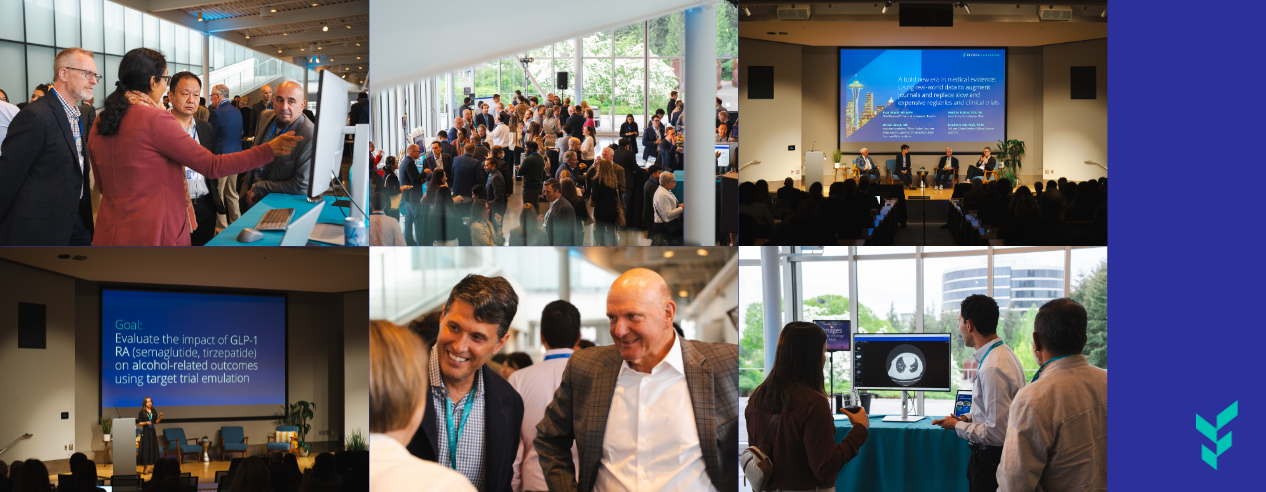
This week we gathered with leaders across healthcare, public health, and life sciences at the 3rd annual Truveta Symposium. Truveta Symposium uniquely brings together leaders from life science, public health, and healthcare organizations to collaborate on health research with real-world data, embracing generative AI to transform healthcare, and improving patient care and outcomes for all.
Here are our top takeaways:
1. Real-world data is reshaping the gold standard
The long-held dominance of randomized controlled trials (RCTs) is being reevaluated. While RCTs remain critical, they’re increasingly seen as incomplete on their own—slow, expensive, and often disconnected from the real-world patient experience. Symposium speakers showcased how regulatory grade real-world data (RWD) can complement or even replace certain trial elements, improving causal inference, patient representation, and speed.
“RCTs are the best method we’ve had—but not the only one.”
2. Entering a new era of cancer research
Cancer affects nearly 40% of the US population over a lifetime, but cancer data is notoriously complex. Unlocking its full potential means integrating unstructured EHR data, genomics, treatment timelines, biomarkers, and social drivers of health. With over 7 billion clinical oncology notes and a growing genomic database on the horizon, researchers are gaining the multidimensional view needed to accelerate oncology breakthroughs.
3. Agentic AI will redefine healthcare research and discovery
The second wave of AI is here—and it’s being driven by agentic intelligence networks: systems made up of specialized, task-focused agents that collaborate, reason, and continuously learn. This paradigm shift is enabling healthcare AI to move from reactive assistance to proactive problem-solving. Across industry, agentic AI is powering everything from clinical trial matching to predictive modeling and automated abstraction of complex clinical data. Truveta is at the forefront of this evolution, applying agentic AI to automate data normalization, extract clinical concepts from unstructured notes, and support researchers through its intelligent assistant, Tru.
4. Getting more therapies to more patients
A common refrain throughout the Truveta Symposium: patients deserve faster access to safe, effective therapies. By leveraging existing clinical data—both structured and unstructured—researchers can move beyond manual data extraction and into a future where scientifically rigorous, EHR-driven studies accelerate discovery. Better evidence, generated more efficiently, means broader and more equitable impact.
“If we can speed up and have data quality, don’t our patients deserve that? Don’t our providers?”
5. Genomics and real-world data are finally coming together
One of the most forward-looking conversations at this year’s Symposium focused on the fusion of genomic data with real-world clinical data. Earlier this year, the Truveta Genome Project was announced to create the largest and most diverse database of genotypic and phenotypic information ever assembled—unlocking new potential for precision medicine, early detection, and disease prevention. As AI matures, the combination of genomic and clinical data is poised to transform how we understand and treat disease.
Looking ahead
The Truveta Symposium highlighted a clear shift in healthcare research—one that is faster, more inclusive, and grounded in real-world data. With breakthroughs in AI, genomics, and clinical analytics, our life science and healthcare customers and partners are redefining how evidence is generated, making it more timely, representative, and actionable.
Thank you to all our partners who joined us this week to connect, share, and collaborate. Your insights and commitment are helping shape the future of healthcare.
Interested in seeing one of the demos shared at Truveta Symposium? Reach out to us today!

